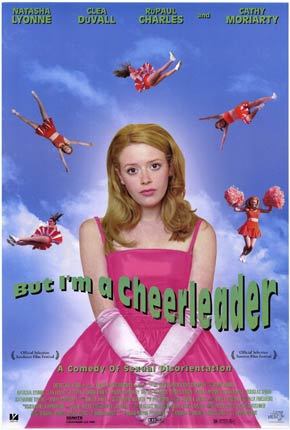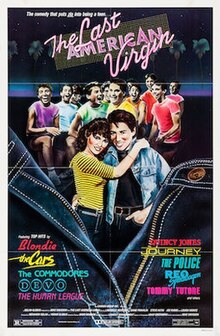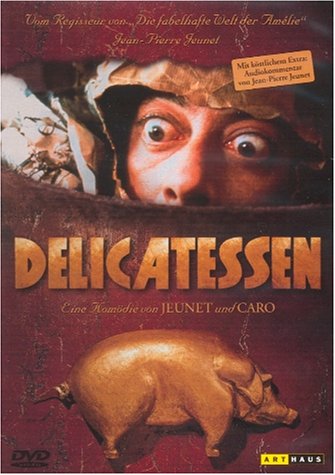 The Movie:
The Movie: Charlie Brewster (William Ragsdale) is a more or less ordinary teenager who just wants to survive high school, watch his horror movies, and eventually get into his girlfriend Amy’s (Amanda Bearse, later of Married With Children) pants. Not necessarily in that order. Unfortunately, he finds himself with a very unordinary problem. It all starts when his new neighbor, Jerry Dandrige (Chris Sarandon of the
Princess Bride,
Child’s Play, and many, many other movies), moves in.
This new neighbor is weird. The first night Charlie catches a glimpse of him, Dandrige and his roommate, Billy Cole (Jonathan Stark), are carrying a coffin into the basement. Then he notices a parade of beautiful women, usually prostitutes, who go into the house only to be found murdered later. Then finally one night, while Charlie is using binoculars to look through the neighbor’s window; he sees Dandrige grow fangs and bite one of said women on the neck. Charlie realizes that he is living next door to a vampire.
Unfortunately, Charlie seems powerless to do anything about it. His efforts to tell someone only manage to convince Dandrige that he is a threat. Charlie’s mother and friends think he’s losing his mind; and after his first attempt to get the police after Dandrige, they want nothing more to do with him. In desperation Charlie turns to his hero, the actor Peter Vincent (the late Roddy McDowall, of
Planet of the Apes,
Class of 1984,
Lassie Come Home, and the gods only know how many other movie and television roles), who is famous for his roles as “the Great Vampire Slayer” and hosts Fright Night, a horror movie TV show. Unhappily for Charlie, Peter Vincent doesn’t believe in vampires any more than anybody else.
It all comes to a head when Charlie’s best friend, “Evil” Ed (Stephen Geoffreys, of
978-EVIL, who later went on to do a lot of gay porn), and Amy employ Peter Vincent to help show Charlie that Dandrige isn’t really a vampire; a plan Dandrige eagerly goes along with. On that night, Peter sees something that convinces him that Charlie may be right after all; while Dandrige discovers that Amy is the doppelganger of some long lost love of his. He also finds a piece of Peter’s mirror, and realizes that his cover has been blown. With Ed changed into a vampire, and Amy in Dandrige’s clutches; Charlie and Peter have only each other to turn to in their struggle to destroy the monster before he destroys them.
The Review: I have been a student of folklore most of my life; and I have long found the vampire to be extremely fascinating. Probably most fascinating is the evolution he has taken in the popular mindset. All cultures have some form of vampire like being, some of them extremely bizarre. However, the originator of our modern day vampire is probably from the middle ages; essentially an avatar of the plagues that were the terror of the time.
The first major influence on our popular image of the vampire first came around the end of the nineteenth century with Bram Stoker and his novel Dracula. Universal Studios and Bella Lugosi immortalized some of the elements Stoker introduced, as well as introducing a few more of their own, in the 1930s. Bella Lugosi remained the main image of the vampire through the end of the twentieth century, when it started to undergo another major evolution, this time into something really sexy and cuddly. The shameful end to this evolution (or perhaps devolution would be more accurate) is Twilight and its ilk, with sparkly, sexy, tragically hip “vampires” that really don’t mean to do any harm. It boggles the mind to try to envision it getting any worse, although human ingenuity has proven to be extremely competent in that regard.
I started losing patience long ago with Lugosi pastiches, and have never had much patience to begin with toward the tragically sexy vampires. So, it’s interesting that while Fright Night dips its toe into both fetid pools, it remains one of my favorite movies. Dandrige’s strengths and weaknesses are all from the Universal Studio days. Likewise, Dandrige is the sexiest vampire I have ever seen on a movie screen (at least in regards to male vampires), and I do not mind saying it because it’s the truth. However, it works because the rest of the movie is so good. Tom Holland, who directs the movie, uses these elements; but he uses them well, and he makes sure that they aren’t all there is.
Let’s start with the element that makes or breaks movies of this type: the vampire himself. Chris Sarandon as Jerry Dandrige is the best part of the movie, and essentially carries it. Much of this has to do with the script and the character; but I cannot imagine anybody but Sarandon doing this part and it being even the tiniest fraction as good as it is. In short, Sarandon creates a vampire that is believable on all levels; dangerous, charming, sexy, and scary.
For the first half of the movie, the horror comes from Charlie’s being all alone against a threat that holds all the cards. Dandrige plays a cat and mouse game with Charlie that Charlie is always on the losing end of. That Sarandon plays such a multi-faceted role, and plays it so well is nothing short of amazing; he simultaneously plays Dandrige both as how Charlie sees him and how other people with Charlie see him, and he pulls it off beautifully. There are scenes where Dandrige and Charlie are in the same room with somebody else, and Dandrige speaks to Charlie with phrases that, to him, are obvious and blatant threats; but are innocuous enough that nobody else picks up on them (“That’s right Charlie, you’ve already caused your friends enough pain. You wouldn’t want to cause them any more, would you?”). And it’s convincing from both ends.
Likewise, when Dandrige attacks he’s equally convincing; whether quietly threatening or all out savage monster. For the most part it’s Sarandon’s screen presence that sells the roll; when he is on screen you just can’t take your eyes off him. The scene where the major characters all meet for the first time is probably the best example. There is a buildup; Billy Cole calls out that company is here, and simply responds to Peter’s comment that maybe he didn’t hear him with just “he heard all right.” To describe what follows to you would make it so anticlimactic as to seem funny; Sarandon comes down the stairs eating an apple. Yet, he’s got such presence that it instead seems damn impressive. It’s easy to see why the rest of the cast can’t take their eyes off of him; the audience is reacting the same way.
There is one more fear that Dandrige plays on; and it is such an integral part of the plot that I’m surprised I haven’t seen more on it in other reviews. In essence Dandrige represents a fear that all men face at some point in their lives; the fear of losing your significant other to somebody who is superior to you in everything. Once Dandrige starts gunning for Amy; the real threat Charlie faces becomes simply that he’s losing her to Dandrige. The fact that Dandrige is an evil vampire who will probably turn her into something like himself, and kill Charlie, suddenly becomes a minor detail in comparison.
A classic part of the vampire film is where the vampire goes after the love interest. Where Fright Night is different is in how it handles it. In most of the movies the vampire has the heroine under some kind of supernatural trance or domination. Not Dandrige, though.
Now, how do I put this… simply, I am straight. That’s something I’ve never doubted, nor has anyone who has known me. It puts me in the minority in my social circle even, but it’s something me, my family and my friends have always taken for granted. Now, when I tell you that I find Sarandon a major turn-on in this role, that should tell you something. If he can have that effect on a red-blooded heterosexual, then what chance does a mousy teenage girl have against his charms? Exactly.
And that’s what Fright Night does so beautifully; Amy’s attraction to Dandrige has no supernatural compulsion behind it whatsoever. In fact, in the scene in the nightclub where Dandrige finally makes his move on her; she’s teasing, flirting with and manipulating him. And doing it very successfully I might add. Even after she realizes what Dandrige is, it’s clear that Amy is not at all unwilling about his advances. The movie also makes it clear from the very beginning that even if it weren’t for the whole demonic bloodsucker thing, Dandrige is not a man you want anywhere near your significant other; whatever their gender. For us guys, that turns him into a whole different kind of nightmare entirely.
The final major element about Dandrige that I found impressive was how the movie fleshed him out. First, it’s obvious that he has a back story; but we never hear it. Although the fact that he has lots of old pictures of what could be Amy’s identical twin quite rightfully makes us fear that the movie will use that hoariest of clichés, the immortal’s reincarnated love; it actually turns out to be a very minor part of the plot. It just provides a reason for Dandrige to be interested in Amy in the first place. We never find out her name, or what their relationship was, or anything. All Dandrige ever says on the subject is “she’s somebody I used to know, a long, long time ago.”
Also, there are a few throwaway lines Dandrige gives that seem to indicate he’s not completely happy with who he is or what he’s done. In his first confrontation with Charlie, Dandrige tells him: “I’m going to give you something I don’t have, a choice.” Similarly, when he seduces and vamps Ed, he tells him, sounding very sincere and sympathetic: “I know what it’s like to be different.” These small touches help to round him out, and make him believable. They even make him sympathetic, but the movie very deftly avoids the catastrophic mistake (i.e. Francis Coppola’s Bram Stoker’s Dracula) of making him so sympathetic you’re left unsure as to whether you should be cheering for or against him. The movie never loses sight of the fact that Jerry Dandrige is a dangerous monster; and the fact that we can feel some sympathy for him just makes us wonder what we’re capable of ourselves.
One more small detail, one I probably don’t need for this review; but I just like it. Dandrige has a few quirks that don’t serve much, if anything, for the plot; but just make him seem more human. The main one is that he likes apples; almost every time he comes on the screen he’s either eating an apple, or Billy Cole tosses him one to eat. Also, he whistles “Strangers in the Night” a lot.
Now, the other major pillar for the move; our fearful vampire hunters. The thing I really like about Charlie Brewster and Peter Vincent is that they complement each other. Each is an individual with his own strengths and flaws, and yet Peter’s strengths make up for Charlie’s weaknesses and vice versa. In short, they need each other to succeed.
I suspect that Peter is supposed to become some kind of father figure to Charlie. Charlie obviously doesn’t have a father in his life. He never comes up, so we never learn what happened with him, but he is very conspicuous by his absence. However, a throwaway line from Charlie’s mother near the beginning suggests that she’s had bad luck involving men.
In that light, it’s interesting that once Peter joins Charlie in his fight against Dandrige; he starts performing typical fatherly duties. At least, as typical as anything can be when you’re fighting a vampire. During the battle he’s constantly trying to rein Charlie in when he goes off half cocked, and he interposes himself between Charlie and Dandrige several times.
Charlie is a more or less normal teenager. He’s not one of the in-crowd, but he’s not an outcast either. In fact, the only unusual thing about him is his interest in horror movies. The majority of Charlie’s strengths and weaknesses actually stem from the fact that he’s a kid, and therefore thinks and acts like a kid.
In the weaknesses column, Charlie tends to be impulsive and not think things through. For example; one of the first things he tries to do when he finds out about Dandrige is to get the police after him. Not a bad idea; but most of us in the audience will get a sinking feeling when we see how he does it. Charlie brings an officer over to Dandrige’s house and seeks a confrontation. Of course, it goes badly; especially when Charlie gets frustrated about Billy Cole’s evasion and insists that Dandrige is a vampire. This only serves to alienate the police and tip his hand to Dandrige.
However, that impulsiveness and single-mindedness does grant some of Charlie’s strengths. First of all, he knows what he is facing and he knows what has to be done. Despite all the pressure from everyone around him, Charlie hasn’t matured enough yet to close his mind to what’s right in front of his eyes just because people tell him it can’t happen. It’s also what poses the threat to Dandrige; Charlie will make mistakes, but he’s not going to give up until he’s dead or otherwise permanently incapacitated. Charlie may make a lot of mistakes, but Dandrige only needs to make one.
It should also be noted Dandrige’s reactions to crosses. Whenever Peter confronts him with one, Dandrige will only laugh, and mock him and tell him he needs faith for it to work on him. You’ll notice Charlie never has this problem.
As for Peter Vincent; Peter is an intelligent, thoughtful, and innovative. He knows more about vampires than even Charlie. Admittedly he’s also something of a coward. However, like with Charlie being the kid, most of Peter’s strengths and weaknesses come simply from him being the grownup.
On the weakness side, Peter has the typical closed mind that society tends to pass off as maturity. He knows vampires don’t exist, so he reflexively disregards the thought of one in town. When Reality rudely intrudes to show him otherwise, his initial reaction is to curl up into a little ball and have a breakdown; and he still has a little bit of trouble accepting what’s going on.
But, when it comes to strengths, his biggest asset to Charlie is that he is able to bring grown-up thought to the table. Unlike Charlie, Peter plans and thinks things through before acting. For example, when Charlie goes to Dandrige’s house for the endgame; all he brings with him are one wooden stake, a hammer, and the tiny cross he keeps in his pocket. Peter on the other hand not only brings extra stakes, crosses and a mallet; but he also packs a flashlight and a revolver to use on Billy Cole.
As well, once in the house it’s Peter who solves the less direct obstacles; such as getting Charlie out of a locked room without Dandrige hearing, or getting at Dandrige in his coffin when he’s locked it from the inside. Peter is also the one who keeps Charlie going with encouragement when it finally reaches the point where it’s too much for him.
Two other characters I would like to address: Billy Cole and “Evil” Ed. Billy Cole is just the vampire’s human henchman for the most part, so he doesn’t have a large part. However, Stark does a wonderful job of having him both pleasant seeming, and subtly threatening.
As for Ed, he interests me because he’s someone (many someones, actually) who I recognize from my own high school experiences. Unlike Charlie, Ed is an outcast. His nickname, Evil, and the fact that it is obviously not a nickname he carries willingly, show that. I remember him, have been him even; he’s the guy who decides that since he’s only ever going to get negative attention, that’s what he’s going to put all his effort into.
In that light, Ed is a very sad character. Even as a vampire, he comes across more pitiful and pathetic than scary. The scene where he dies is heartrending, and adds some genuine pathos to the movie.
As for the movie itself, Fright Night actually follows a pretty tight script. The story and the conflicts are all relatively simple, although there are enough twists and turns to keep it interesting. While a good deal of the movie is funny, the majority of the scenes of Charlie’s conflicts with Dandrige are very scary. The final battle, especially, is very suspenseful.
Finally, Fright Night has the one element that is so essential to any good horror story, and yet we see so little of; we care about the characters. Overall, Fright Night is a great movie, and one well worth re-watching.








